
Fortune News | Oct 09,2021
Mar 14 , 2020
By Getachew Asfaw
The broad money supply has grown immensely and Ethiopia is long overdue to limit the quantity of inflationary monetary financial assets as a means of payment or asset holding and introduce non-monetary ones, writes Getachew Asfaw (getachewasfaw240@gmail.com), who holds an MSc in national economic planning.
There are two outstanding theories of money supply. The first, the Keynesian school, led by the great British economist John Maynard Keynes, known as the father of macroeconomics, contends that an increase in money supply in the short run could primarily result in a growth of output, but the long-term effect could be a rise in the inflation rate. The second, the Monetarist school, led by American economist Milton Friedman, is that both in the short and long term, an increase in the money supply will primarily increase the inflation rate rather than increase output.
Almost three decades ago, when the EPRDF came to power, the money supply was less than 10 billion Br. Now it is a hundredfold higher. This is a growth rate of approximately 30pc annually for thirty consecutive years, which by the standards of both of these theories is inflationary. In 2018/19, the growth of the money supply decreased to 19pc, while the nominal GDP growth rate was 24pc. According to the National Bank of Ethiopia (NBE), this is a step forward toward decreasing the inflation rate.
This comparison is sufficient by itself, however, because nominal GDP itself is the effect of the money supply. The correct analysis would be to compare the money growth rate with real GDP growth. If the latter was growing at an 11pc average out of the thirty percent increase in the money supply, the remaining 19pc was going to raise the inflation rate.
Out of the two factors influencing the broad money supply, domestic credit to the private sector and the government is growing persistently, standing at almost a trillion Birr. This is while net foreign assets, which could be a proxy measure of foreign reserves in the balance of payment, have plummeted to just 14 billion Br in 2018/19 from 39 billion Br the previous year. The declining proportion of foreign assets to domestic assets depreciates the value of the Birr in the nominal exchange rate.
We are long overdue for limiting the quantity of inflationary monetary financial assets as a means of payment or asset holding and instead introducing non-monetary ones. Although liberalising the financial sector has its own drawbacks, a shift from monetary asset financing to non-monetary financing could be a remedy to the prevailing high rate of inflation and financing problems in the economy.
This kind of liberalising means moving away from bank or credit-based financial systems to a market-based one. Both systems have their own advantages and disadvantages as we have seen them practiced successfully around the world. The United Kingdom and the United States developed using the market-based financial system, whereas Germany, France, Japan and South Korea used credit-based financial systems in their journey to economic development. Since the advantages and disadvantages of both systems are multifaceted, the correct choice depends on the context of each country.
Market-based financial systems are segmented into institutions specialised in different maturities, as well as different liquidity and credit risks. Commercial banks provide investors with short-term liquidity; investment banks operate through the underwriting of initial public offerings (IPOs) and financing long-term investments; mortgage banks finance the construction of houses.
The financial market has two broad categories: the capital market, which is a market for debt and equity securities extending over a year; and the money market, which is a market for securities with a maturity date of less than a year. The former could be a stock market, and the latter are mutual fund investment companies that discount, liquidate or cash security assets.
One of the biggest questions investors face is, “What do I do with my cash when I am in between investments.”
Given the low levels of financial literacy in Ethiopia even among the business community, and because of information asymmetry and the risk of insider trading, individual investors are not good agents for promoting capital markets by themselves. Thus, money market institutions such as mutual funds are required to complement the capital market.
A mutual fund pools together the monetary assets of members and distributes to a diverse portfolio of investments. This is to safeguard members from total losses by insuring profit in some types of investments to compensate for losses in other assets. To add to their income, mutual funds also serve outsiders for a commission price.
To complement the capital market, short-term money market instruments such as debt securities, banker’s acceptances, commercial papers, municipal papers, repurchase agreements or repos, negotiable certificates of deposit and treasury bills should be traded. This should also include derivatives such as swaps, options and futures with a maturity of one year or less. These are generally safe instruments that return a relatively low interest rate that is most appropriate for temporary cash storage to institutional investors.
There is a grave need to employ professionals first. It takes immense technical knowledge to establish institutional channels, fund management bodies and advisory consulting establishments such as underwriter investment banks, mutual and trust fund investment companies and brokerage offices.
These groups will promote a mix of the capital and money market and will be able to automatically sweep their customer’s un-invested cash into money markets in order to earn interest between long-term investments. They will also use it to diversify their portfolio investments to reduce potential risks.
Opening up the capital account of the balance of payment to foreign portfolio investors to complement domestic savings with foreign savings, however, raises quite a number of concerns. As the inflow and outflow of foreign currency could be erratic, because of the tendency of foreign investors to speculate for short-term gains arising from differences in interest rates between countries, pressure would be placed on the balance of payments and the exchange rate.
Indeed, finance is highly complicated, and the smallest of mistakes has ripple effects. It is up to the government to assess and take acceptable risks for long-term improvement.
PUBLISHED ON
Mar 14,2020 [ VOL
20 , NO
1037]


Fortune News | Oct 09,2021

Agenda | Jun 12,2021

Radar | Feb 01,2020

Viewpoints | Jan 22,2022

Viewpoints | Dec 10,2022

Radar | Apr 03,2023

Radar | Apr 30,2024

Viewpoints | Dec 19,2018

Fortune News | Oct 23,2018

Commentaries | Oct 23,2021

My Opinion | 132272 Views | Aug 14,2021

My Opinion | 128692 Views | Aug 21,2021

My Opinion | 126600 Views | Sep 10,2021

My Opinion | 124206 Views | Aug 07,2021





Dec 22 , 2024 . By TIZITA SHEWAFERAW
Charged with transforming colossal state-owned enterprises into modern and competitiv...

Aug 18 , 2024 . By AKSAH ITALO
Although predictable Yonas Zerihun's job in the ride-hailing service is not immune to...

Jul 28 , 2024 . By TIZITA SHEWAFERAW
Unhabitual, perhaps too many, Samuel Gebreyohannes, 38, used to occasionally enjoy a couple of beers at breakfast. However, he recently swit...

Jul 13 , 2024 . By AKSAH ITALO
Investors who rely on tractors, trucks, and field vehicles for commuting, transporting commodities, and f...

Jul 12 , 2025
Political leaders and their policy advisors often promise great leaps forward, yet th...

Jul 5 , 2025
Six years ago, Ethiopia was the darling of international liberal commentators. A year...

Jun 28 , 2025
Meseret Damtie, the assertive auditor general, has never been shy about naming names...

Jun 21 , 2025
A well-worn adage says, “Budget is not destiny, but it is direction.” Examining t...

Jul 13 , 2025 . By YITBAREK GETACHEW
The Addis Abeba City Revenue Bureau has introduced a new directive set to reshape how...

Jul 13 , 2025 . By BEZAWIT HULUAGER
Addis Abeba has approved a record 350 billion Br budget for the 2025/26 fiscal year,...

Jul 13 , 2025 . By RUTH BERHANU
The Addis Abeba Revenue Bureau has scrapped a value-added tax (VAT) on unprocessed ve...

Jul 13 , 2025 . By NAHOM AYELE
Federal lawmakers have finally brought closure to a protracted and contentious tax de...